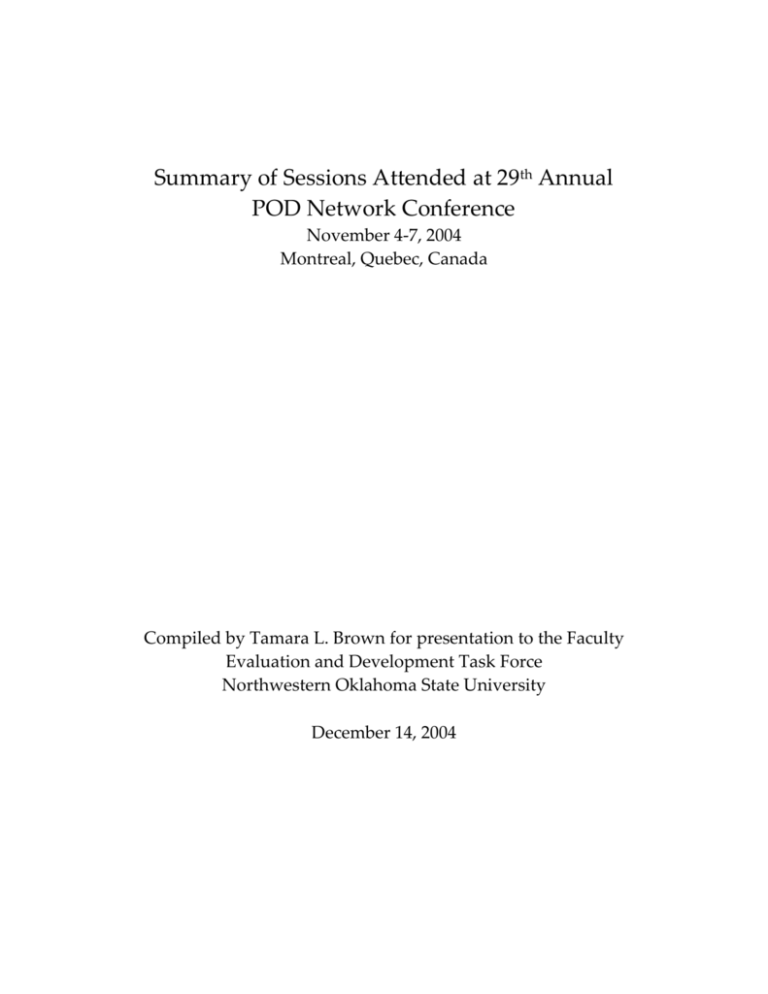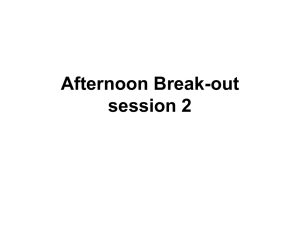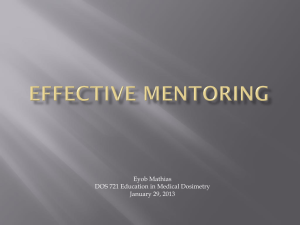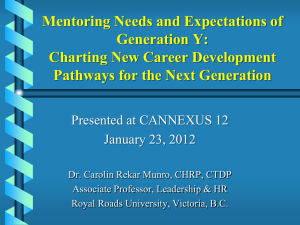POD-SummaryofSessionsAttended
advertisement

Summary of Sessions Attended at 29th Annual POD Network Conference November 4-7, 2004 Montreal, Quebec, Canada Compiled by Tamara L. Brown for presentation to the Faculty Evaluation and Development Task Force Northwestern Oklahoma State University December 14, 2004 “Increasing the Reach: Structuring Faculty Development at Small Colleges” -James Sloat, Beth Bennett, Anthony Fleury, Dana Shiller, Washington and Jefferson College -Presentation of the Faculty Associate Model (Please see other handout.) “Empowering New Faculty through Mentoring” -Heather Kanuka & Anthony Marini, University of Calgary -Studies reveal that most faculty are dissatisfied and become more dissatisfied over time. -Reasons for dissatisfaction include: lack of collegial relationships lack of integration of personal and professional lives little or no feedback, recognition, and/or reward unrealistic expectations with insufficient resources and support systems -Myths about mentoring include: spontaneous mentoring is more effective than structured pairing existing friendships = good mentoring relationships older faculty make the best mentors one-on-one mentoring is better than group mentoring cross-department mentoring is less effective than within-department mentoring personality profiling results in effective pairing -Strong mentoring programs have a benefit triad. There are a number of benefits for the new faculty, the experienced faculty, and the institution. -Mosaic mentoring or group mentoring is characterized by a number of different individuals mentoring one person. “Promoting Deep Learning: Ways Faculty Developers Can Assist Faculty” -Jim Eison, University of South Florida -Classroom activities should promote in-depth exploration and self-reflection instead of surface learning. -Elements that foster a surface approach to learning include: excessive amounts of work little opportunity to look at topics in-depth minimal student choice anxiety-provoking assessment rewarding of regurgitation of factual information --Elements that foster deep learning include: motivational context stimulation of active learning encouragement of interaction incorporation of well-structured knowledge-base inclusion of application utilization of interaction in the classroom connection of information modeling of deep learning “Mission Impossible: Decentralized, Collaborative, Innovative, and Successful Faculty Development” -Felicia Ruff-Anarumo & Devorah Lieberman, Wagner College -The mission for this small liberal arts campus was to bring faculty discourse into a public setting. -Faculty members partner with guest professionals. Faculty members observe the master professionals teach students so they develop different ways to teach. -This also benefits the students as they are learning from other professionals. “Tailoring Faculty Development Programs to Faculty Career Stages” -Peter Seldin -Professional development needs change over time. -Beginning teachers (1-5 years) need development for: enhancing skills in the classroom enhancing knowledge in their discipline -Mid-career professors (10-20 years) need development for career assessment allowing for: identification of new professional endeavors exploration of new roles expansion of overall career goals -Senior faculty (30 plus years) need development to help them transition to retirement. Activities should allow for: a meaningful legacy (mentoring) preparation for retirement -Faculty development activities should match the career stage of the faculty member. “Keys to Designing Effective Group Activities and Assignments” Larry K. Michaelsen, Central Missouri State University www.teambasedlearning.org “Using Cooperative Games to Promote Learning” Barbara J. Millis, University of Nevada at Reno -There are many advantages to using games in the classroom to promote learning. -Games: provide immediate peer feedback motivate students to participate allow the teacher to assess students understanding of course content provide repeated practice for mastery of skills incorporate emotional learning for long-lasting learning tap into alternative intelligences and learning styles “Models for Faculty Development/T&L Centers at Small Colleges Melissa Clearfield, Whitman College; Michael Reder, Connecticut College; Susanne Morgan, Ithaca College; Stephanie Fabritius, Southwestern University; Jeffrey A Halprin, Nichols College; Kathy Harring & Kathy Wixon, Muhlenberg College; Mary Pat Neylon, Molloy College -Please see other handout. “Selling Faculty Development to Administration: Identifying Best Practices” -Linda Miller, Murray State University; Sally Kuhlenschmidt, Western Kentucky University; Catherine Wehlburg, Texas Christian University -It is important to understand your administrators in order to acquire their support for faculty development. -Use of the “Administrator Profile” (by Sally Kuhlenschmidt) can help one understand the administrator.






